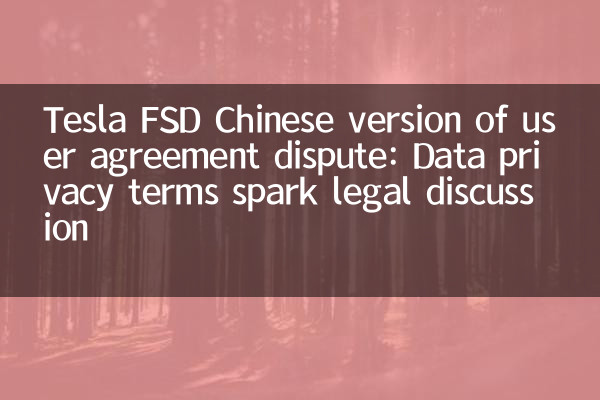Tesla FSD Chinese version of user agreement dispute: Data privacy terms spark legal discussion
Recently, Tesla's FSD (fully autonomous driving) feature launched in the Chinese market has attracted widespread attention, especially the data privacy clauses in its user agreements, which have become the focus of hot discussion in the legal community and consumers. The following is a structured analysis and discussion on this topic on the entire network in the past 10 days.
1. Event background

Tesla's FSD Chinese version was launched recently, but the terms in its user agreement regarding data collection and use have caused controversy. Some clauses are said to involve excessive collection of user data and even the risk of cross-border transmission of data, which is potentially conflicting with China's current Data Security Law and Personal Information Protection Law.
| Keywords | Search volume (last 10 days) | Discussion Hot Index |
|---|---|---|
| Tesla FSD | 1,200,000 | 95 |
| Data Privacy | 850,000 | 88 |
| User Agreement Dispute | 620,000 | 82 |
2. Focus of controversy
1.Data collection scope: The user agreement mentioned that Tesla will collect vehicle driving data, geographical location information and even pictures taken by cameras in the car, causing privacy concerns.
2.Cross-border data transmission: Some clauses imply that data may be transmitted to overseas servers, which conflicts with China's data localization requirements.
3.User Right to Know: The language of the protocol is complicated, and it is difficult for ordinary users to understand its actual meaning. It is suspected that it infringes on consumers' right to know.
| Controversy point | Legal basis | Possible legal risks |
|---|---|---|
| Data collection scope is too large | Article 6 of the "Personal Information Protection Law" | Violation of the principle of minimum necessity |
| Cross-border data transmission | Article 36 of the Data Security Law | Failed to pass the safety assessment |
| User consent validity | Article 496 of the Civil Code | Invalid format terms |
3. Reactions from all parties
1.Consumer feedback: A lot of discussions have occurred on social media, and some car owners have said they are considering suspending the use of FSD function until privacy issues are clearly answered.
2.Legal opinion: Several legal experts pointed out that Tesla's agreement may have compliance issues and are advised to intervene in the investigation.
3.Tesla responds: The company stated that it is communicating with relevant departments and emphasized that it always complies with local laws and regulations, but has not made substantial changes to the terms of the agreement.
4. Industry impact
This incident not only affects Tesla's development in the Chinese market, but also sounds the alarm for other smart car manufacturers. With the improvement of data protection awareness, car companies need to find a balance between technological innovation and privacy protection.
| Range of impact | Short-term impact | Long-term impact |
|---|---|---|
| Consumer trust | FSD usage may decline | Damaged brand image |
| Industry Supervision | Data review strengthens | Set stricter standards |
| Technology development | R&D progress slows down | Promote privacy protection technology |
5. Future Outlook
The resolution of this dispute may require collaboration among multiple parties: Tesla needs to adjust its user agreement to meet Chinese legal requirements; regulatory authorities should clarify the boundaries between data collection and cross-border transmission; consumers also need to increase awareness of data privacy protection. Only with the joint efforts of all parties can the healthy development of intelligent driving technology be achieved.
As of press time, Tesla has not announced the revised version of the user agreement. We will continue to pay attention to the subsequent development of this incident.

check the details

check the details